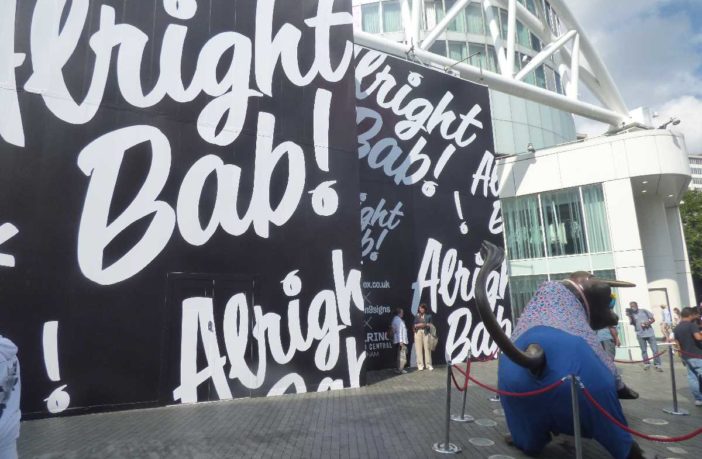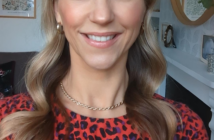Alright bab?
First, I must make an important disclaimer. I am not, technically, a Brummie. My family are all Brummies, though they’ve mostly scattered out of the second city. I’ve always lived in the West Midlands, and a few years ago, I moved to Birmingham as a student. Growing up close to the city, the Brummie accent and dialect triggers many fond memories of my childhood, and living in the city means I hear it everywhere I go.
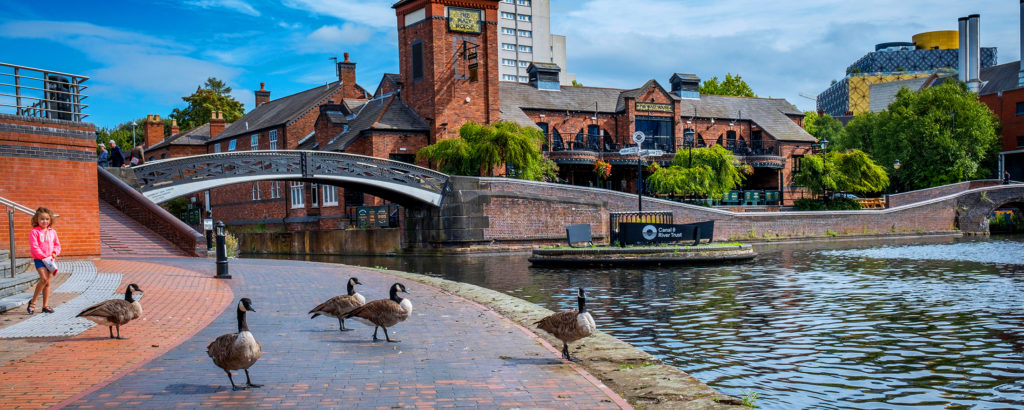
There are certainly fewer Birmingham accents on the campus of the University of Birmingham than I was expecting. As the youngest city in all of Europe, with 40% of Birmingham’s population being under 25, and a 46% graduate retention rate, Birmingham has a diverse pool of accents and an ever-changing population demographic. Perhaps, over time, this will mean that the Brummie accent loses its prominence, but as far as I’ve observed, those who make the second city their home tend to find themselves picking up the lingo pretty quick.
If you’re arriving as a student here, moving to the city or a visiting for the day, and you find yourself asking directions from a Yam Yam (somebody from the Black Country – more on that to follow) you may be scratching your head trying to figure out what on earth they mean by ‘head up past the outdoor and turn left at the island onto the cut’. Fear not – this guide will teach you how to decode Brummie slang and decipher the iconic accent.
What is a ‘Brummie’?
The term ‘Brummie’ refers to a resident of the city of Birmingham. Its origins likely stem from the word ‘Brummagem’, which first appeared in the 17th century as a name for the second city. It is often shortened to ‘Brum’ in the 21st century (note the name of our site!) and thus the locals are branded as ‘Brummies’.
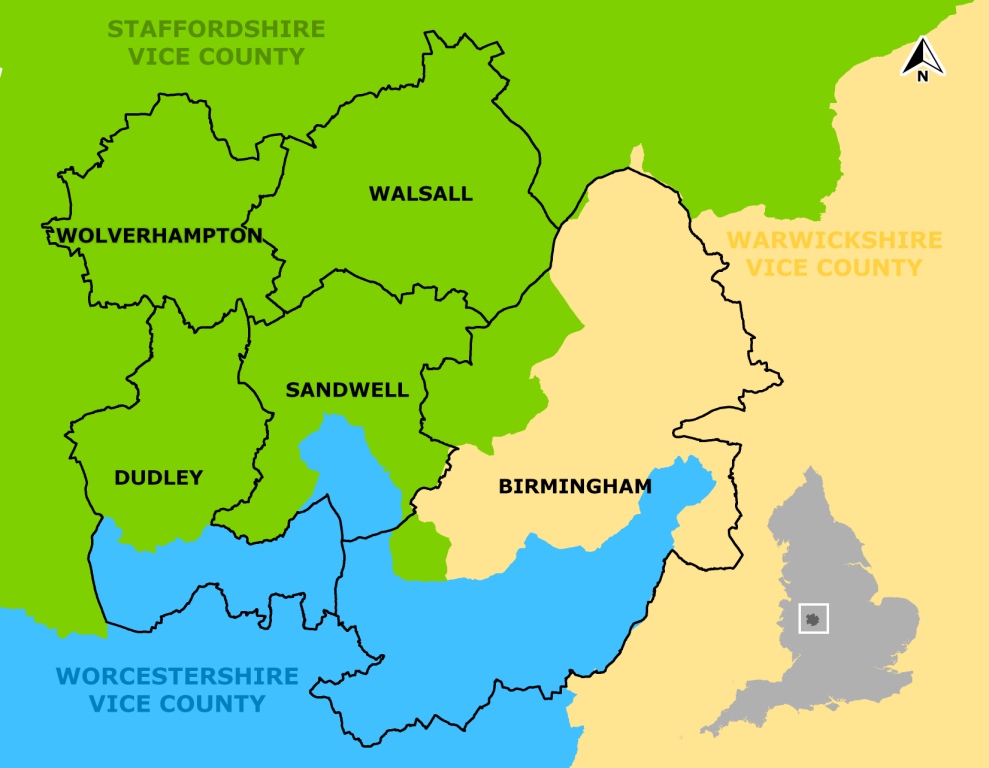
To the west of Birmingham, the Black Country is a loosely defined region in southern Staffordshire and northern Worcestershire, believed to have earned its name from the 19th-century air pollution or the colour of the coal seam. Residents of the Black Country, which holds Dudley as its unofficial ‘capital’, are often lumped in with Brummies, though the accents are distinctly different. Black Country folk are often colloquially titled ‘Yam Yams’, after their tendency to say, ‘yow am’ rather than ‘you are’.
This list will encompass both Black Country and Brummie slang words, as there is certainly some overlap between them. To outsider ears, the accents sound near identical, in the way that Australia and New Zealand appear to have very similar accents to non-residents. Their close proximity means it is very easy to pick up phrases from one another, though any local will tell you that their accents differ considerably.
What does the accent sound like?
Even when using ‘standard’ English dialect, the Brummie accent is strong enough to confuse unfamiliar ears. Here is a brief list of some of the traits of the Brummie accent, to help you chit chat with the locals.
One of the biggest differences is the way Brummies pronounce their vowel sounds, which tend to be drawn out longer than in ‘standard English’, or received pronunciation (RP).
The regular vowel, ‘I’, is often pronounced as ‘oy’, like in ‘choice’ (for example, ‘Oy went to the shops’). Following this pattern, ‘price’ becomes ‘proys’.
The short ‘u’ sound, used in words like ‘up’, ‘above’ and ‘hut’, is often lengthened into an ‘oo’ sound, like in ‘took’.
Whereas ‘water’ is traditionally pronounced as ‘waw-tuh’, in Birmingham it is a little closer to ‘waw-tA’, with the ‘uh’ sound being replaced by a stronger ‘a’ sound. The same applies to a lot of adverbs and words ending -er, including ‘better’ and ‘faster’.
Words ending in a -y, which often make an ‘ee’ sound (like happy, or funny) also sound different in the Brummie accent. Whereas in an ‘ee’ sound, the tongue sits higher, towards the back of the mouth, Brummie pronunciation requires a lower tongue, and creates more of an ‘ay’ sound.
As for consonants, it’s the ‘g’ which makes a big difference. Words with an ‘ng’ sound, like singer, are given a much heavier ‘g’ sound (sin-Ga). However, words with an ‘ing’ ending are often just shortened to an ‘in’, cutting out the ‘g’ altogether, just to confuse you. You’re welcome.
To hear it in action, here is a useful YouTube clip:

Brummie Dialect
Now it’s time for the slang terms, phrases and must-knows of the Brummie (and Yam Yam) regional dialect.
0121 Do One – Get lost/go away. (0121 is the Birmingham dialling code). Brummies aren’t an unfriendly bunch, and the phrase is often said in jest.
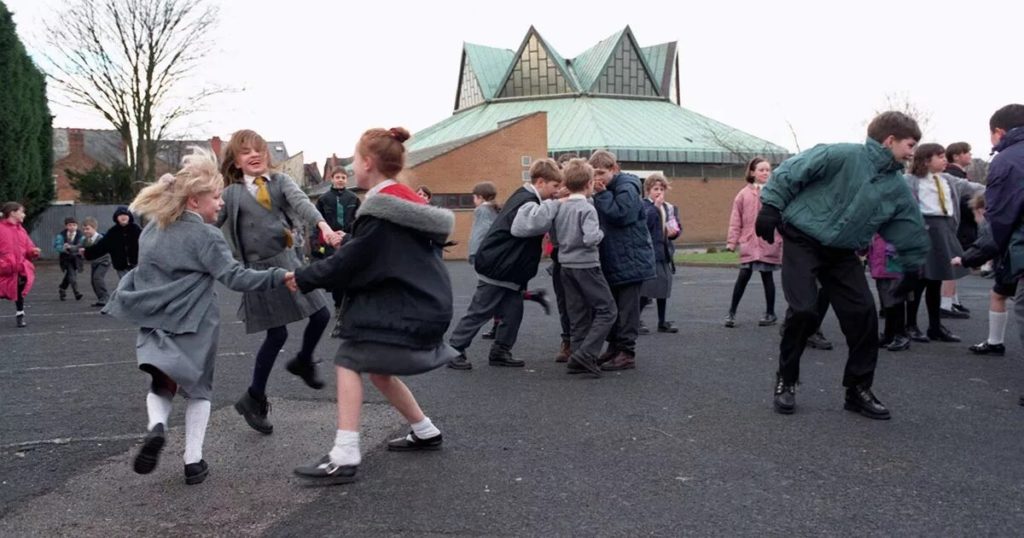
Ackee-1-2-3 – Hide and Seek, sort of. Seemingly a West-Midlands exclusive playground game, Ackee 1-2-3 involved the child who was ‘it’ to count, as is standard, and the other children to hide. ‘It’ then had to find you. When you were spotted, you had to sprint back to the ‘safe zone’ in a race against ‘it’. If they caught you, or beat you back to the safe zone, they yelled ‘Ackee 1-2-3’ and then your name, and you were out. You were ‘safe’ if you beat them back. The first player to be ‘out’ was ‘it’ the next time. Hours of fun.
Aer Kid/ Our Kid – A family member or friend, usually younger.
Alright – Used across the UK as a single-word greeting. In Birmingham, it is often followed with ‘bab’, but not always. If you’re passing someone on the street, and they ask ‘Alright?’, it is not an enquiry into your wellbeing, and the correct response is repeat the word back to them and move on.
Ark at that – This one probably originated in the West Country, but has travelled across to the West Midlands. It is an instruction to look or listen to something that someone has said, usually as a way to draw attention to something foolish.
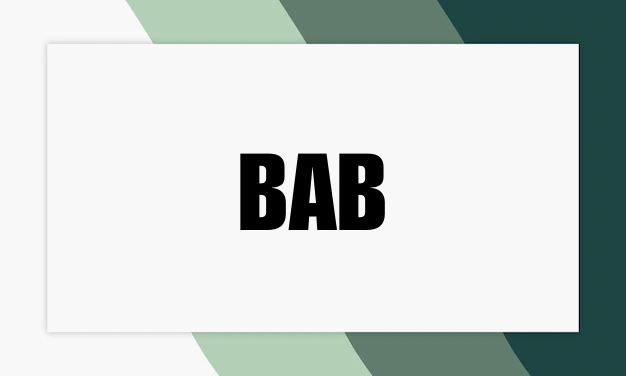
Bab – Nice and simple, bab is a word similar to ‘love’, or ‘dear’. It’s a term of endearment, perhaps slightly more often directed at women, but applicable to people of all gender identities. Anyone can be a ‘bab’, from someone you know and love, to someone you’ve just met.
Babby – A baby. Not sure why we added an extra ‘b’, but as the pronunciation is different (like ‘tabby’ cat) it makes sense.
Bawlin’ – To scream and shout at someone.
Bluenose – A term traditionally used by Aston Villa Football Club fans to taunt their Birmingham City rivals, recently reclaimed by Birmingham City fans.
Bonce – Head.
Bost – Broken.

Bostin’ – Great, super etc. Perhaps equivalent to ‘smashing’ or ‘cracking’. We’re not sure why so many British words for ‘great’ sound so violent, but in true Brummie fashion, bostin has lost its ‘g’ ending. This is a common one, and about as Brummie as it gets.
Bost-up – A fight.
Buzz – The bus.
Cack-handed – An awkward or clumsy way of doing something. This is a term used across the UK, but particularly in Birmingham.

Cob – A bread roll/bap/bun.
The cut – The canal. We have more canals than Venice, you know.
Donny/donnies – Hands.
Ent – Is not.
Entry – The alleyway between terraced houses. There are loads of these in Brum, so it makes sense we’ve developed our own word for them.
Face as long as Livery Street – Someone who looks unhappy. The phrase comes from the road running from Colmore Row to Constitution Hill, a half-mile in length.
Gambol – A forward roll.
Garage – A petrol station.
Gizzit-ere – Give it to me.
Gully – Another term for an alleyway.

Island – A traffic roundabout. Don’t expect anything tropical when someone directs you to ‘take a left at the island’.
Mither/Myther – To bother or annoy somebody.
Mom – We know, very American. For some reason, Brummies call their mothers ‘Mom’ rather than ‘Mum’ or ‘Mam’, and we’re disappointed that the card retailers in the area haven’t updated their Mothers’ Day cards accordingly.
Mooch – To have a wander around, pretty aimlessly, and see what’s there. Often used when shopping.
Mucker – A good friend. Often used prefaced by ‘me old’.
Oss – A horse.
Outdoor – A corner shop/off-license.
Pop – Always refers to a drink, though people argue about what it means, specifically. Many use it to refer to fizzy drinks, like lemonade, but some insist that this is ‘fizzy pop’, and that normal pop is just squash. But they’re wrong, obviously. Some people also use ‘council pop’ to describe tap water.
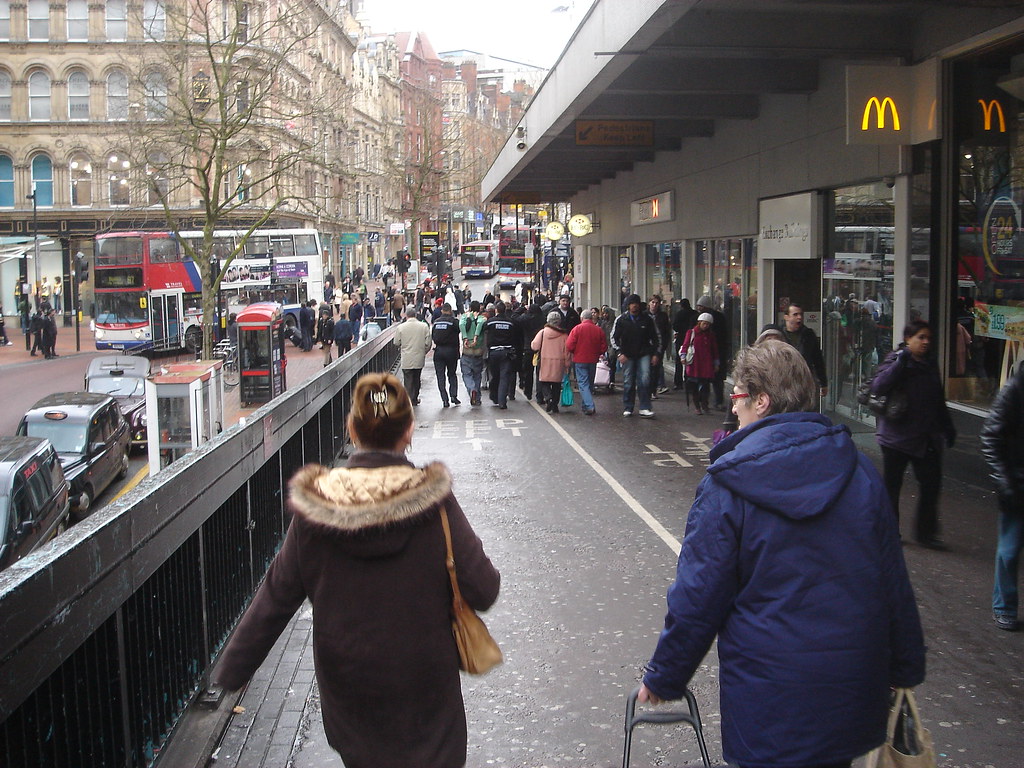
The Ramp – Not necessarily slang, but a must-know location, ‘the ramp’ refers to the sloped path that takes you from the main high street to Grand Central shopping centre. It is home to a McDonalds, and is the unofficial meeting point for anyone in Birmingham. Meeting friends, family, or even a date? Chances are, they’ll ask you to meet at ‘Maccies on the ramp’.
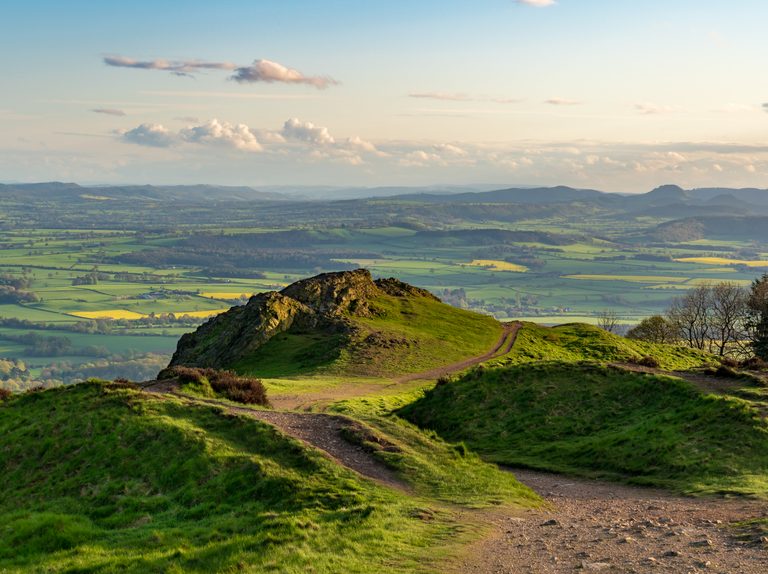
Round the Wrekin – Going the long way round, or telling a long story rather than getting to the point. Named after the Wrekin Hill in East Shropshire.
Scrage – A scrape, scratch or other small but agonising injury, usually picked up on the school playground. Ouch.
Shrapnel – Loose change. This word features all over the UK, but particularly in the Midlands, and I’ve received many confused looks from dropping it in the presence of non-Brummies. Perhaps that’s just because nobody carries change anymore, but we hope this word doesn’t die out.
Sid – Saw.
Tara-a-bit – Maybe slightly more Black Country, but still used by Brummies, ‘tara-a-bit’ is a way of saying ‘see you later’, and is often shortened to ‘tara’.
Tea – This is one to confuse the Southerners, but put your kettle down, ‘tea’ is the evening meal, known as ‘dinner’ in RP.
Tip-top – An ice-pop/lolly – a flavoured liquid, frozen in a long plastic tube. This is one that has lasted the test of time, stemming from the 90s.
Town – We’re a city, not a town, but if you’re ‘going into town’, you’re headed straight to the city centre.

Tranklements – Very Black Country, a lovely little word for trinkets, ornaments or knick-knacks.
Wag – To skip school or bunk off, deliberately.
Wench – Though the term is used everywhere to refer to women, it is interpreted by some as being less-than-friendly. Not in Birmingham though, where it is usually used as a term of endearment towards women and girls. Not sure how we feel about this one – we’ll leave it up to you to decide.
Yampy – Someone who is ‘mad’, ‘crazy’ or a bit daft.
Yowm/ Yow-am – You are.
Representation of, and Reception to the Brummie Accent
Probably the most famous Brummie is Black Sabbath’s Ozzy Osbourne, who grew up in Marston Green. Though he has since moved out of the area, his accent has not disappeared. The popular television programme ‘Peaky Blinders’ has brought the Brummie accent to our screens across the UK and wider world.

Some locals aren’t too happy with the accents put on by the cast, who are not native to Small Heath, and it is true that some of them tend to slip into Scouse or Welsh, even Irish at times. A more minor critique is that their accents are more Black Country than Birmingham. Actors everywhere know that Brummie is a challenging accent to master, and so while Peaky Blinders may not be perfect, as Birmingham representation goes, we’re glad it’s pretty positive.
More generally, the Brummie accent has a bad reputation, met with a lot of stereotypes, and we have no idea why. It’s delightful, and Brummies are some of the friendliest people in the country.
In an interesting, recent conversation at Heath Book Shop with the Labour MP for Birmingham Yardley, Jess Phillips, she recounted the stereotypes she has faced as a woman in politics with a thick Brummie accent. Most notably, she reflected, people think she’s stupid, an unfounded prejudice that affects a lot of regional accents, particularly in the North and the Midlands.
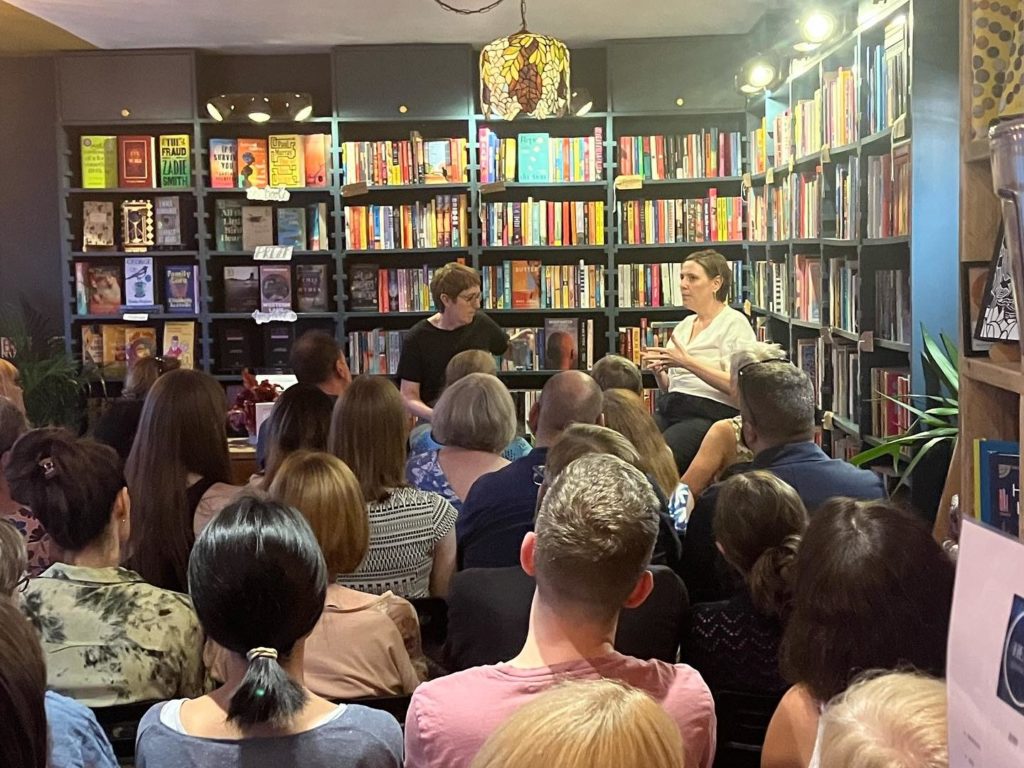
Phillips also mentioned that people associate her accent with being working-class, or even with poverty, which is nonsensical! The thickness of one’s Brummie accent is based on the region in Birmingham they are from, or where they’ve spent the most time, or the people around them. It has nothing to do with finances or class.
My few years at university in Birmingham have reminded me just how wonderful the Brummie accent really is. After a few weeks away recently, I popped back to my local supermarket and was greeted with an ‘alright bab?’ from a lovely shop assistant, and it made my day, reminding me how much I miss the accent when I’m out of the city. If you’re new to the area, listen out for the Brummie accent, and maybe add some of the wonderful terms in the list above to your vocabulary.
Tara-a-bit!

